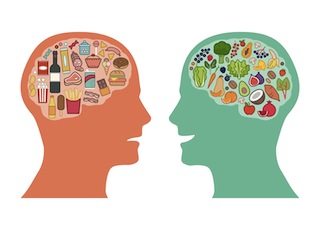 A recent study published in Frontiers in Psychology found that eating raw fruits and vegetables rather than processed, cooked or canned fruits and vegetables is associated with better mental health.
A recent study published in Frontiers in Psychology found that eating raw fruits and vegetables rather than processed, cooked or canned fruits and vegetables is associated with better mental health.
To test the theory that cooking or processed fruits and vegetables contain fewer nutrients than raw fruits and vegetables, which in turn would be less beneficial for mental health, researchers surveyed 422 young adults aged between 18-25 in New Zealand and the United States.
The survey asked participants about their typical consumption of raw versus cooked, canned and processed fruits and vegetables. It also asked them about their current mental health status, whether they had any depressive symptoms, anxiety as well as their overall life satisfaction, socio-economic status, body mass index, sleep and level of physical activity.
Survey results showed that those on a diet of more raw fruits and vegetables, in particular carrots, bananas, apples, dark leafy greens, grapefruit, lettuce, citrus fruits, fresh berries, cucumber and kiwi, had better overall mental health and life satisfaction.
Why are raw fruits and vegetables better for your mental health?
Studies have shown that raw fruits and vegetables have micronutrients that are vital to optimal physical and mental functioning. In particular, vitamin C and carotenoids protect against oxidative stress which has been known to be a cause of depression. To help with emotional and cognitive functioning, vitamin C and the B vitamins and minerals such as calcium, magnesium and zinc are also extremely important.
When fruits and vegetables are heated, canned, cooked or processed, the amount of micronutrients they contain is reduced as well as antioxidants which are vitally important to maintaining optimal mental health.
However, some studies have also shown that while some vitamins are damaged in the cooking and heating process, others are less susceptible to damage such as fat-soluble vitamins A, D, E, and K. Studies have also shown that cooking tomatoes enhances the bioavailability of lycopene and antioxidants.
As for freezing, if you use raw frozen vegetables right away as in a smoothie, they’re likely to retain most of their nutrients. However, if you thaw out frozen raw fruits and vegetables and then cook them, the nutrients will be damaged.
The study’s authors hope that the results of their study could make the case for promoting more of an emphasis on raw fruits and vegetables in health policies.
“Such interventions will require educating individuals on ways to prepare and consume fruits and vegetables that are likely to retain the greatest levels of nutrients,” notes the study.
Some of the barriers associated with encouraging people to consume more raw fruits and vegetables are that it may less convenient as raw fruits and vegetables perish quicker than canned or processed foods, as well as cost and availability.
“Research has also suggested that people eat raw fruits and vegetables as snacks” notes the study, “whereas people incorporate more cooked/canned/processed product into main meals and that sometimes raw fruits and vegetables are not considered satiating enough for a main meal.”
To that end, researchers hope that health policies take into account accessibility and affordability. Another thing to keep in mind is that it may be hard to get people with mental illness symptoms eating raw fruits and vegetables as their negative mood might be influencing their food choices, making them crave sugary foods instead.
The fact that the study used participants in their teens and early twenties was significant because other studies have shown that young adults are highly vulnerable to mental illness and they also have the lowest fruit and vegetable consumption among other age groups.
“In term of application,” notes the study, “our results suggest that policies, promotions, and interventions that are designed to increase raw fruit and vegetable consumption may provide an accessible adjuvant approach to improving mental health in the young adult population, who remain vulnerable to developing mental disorders.”
REFERENCES:
Kate L. Brookie, Georgia I. Best, Tamlin S. Conner, (April 2018), Intake of Raw Fruits and Vegetables is Associated with Better Mental Health than Intake of Processed Fruits and Vegetables, https://www.frontiersin.org/articles/10.3389/fpsyg.2018.00487/full
Patricia Tomasi is a mom, maternal mental health advocate, journalist, and speaker. She writes regularly for the Huffington Post Canada, focusing primarily on maternal mental health after suffering from severe postpartum anxiety twice. You can find her Huffington Post biography here. Patricia is also a Patient Expert Advisor for the North American-based, Maternal Mental Health Research Collective and is the founder of the online peer support group - Facebook Postpartum Depression & Anxiety Support Group - with over 1500 members worldwide. Blog: www.patriciatomasiblog.wordpress.com
Email: tomasi.patricia@gmail.com